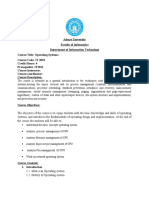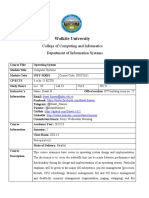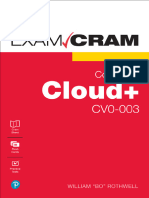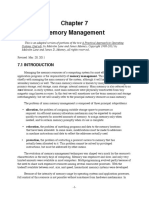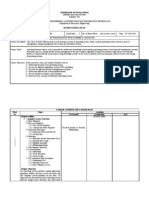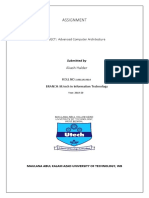1 Name of Course/Module : OPERATING SYSTEM
2 Course Code: BIT 235
3 Name(s) of academic staff:
4 Rationale for the inclusion of the course /module in the programme:
This course offers in depth knowledge on established, convenient and efficient interface between user
programs and the bare hardware of the computer on which they run.
5 Semester and Year offered: year 2 semester 3
6 Course Hours Face to Face
ILT TSLT
L T P O
L=Lecture
T=Tutorial
P=Practical
45 15 - 6 60 126
O=Others
TSLT=Total student learning time
7 Credit Value:3
8 Prerequisite: Nil
9 Course Learning Outcomes:
On completion of this course students will be able to:
Describe the fundamental components of a computer operating system.
Design and construct the following OS components: System calls, Schedulers, Memory
management systems, Virtual Memory and Paging systems useful for lifelong learning process.
Analyse theory and implementation of: processes, resource control (concurrency etc.), physical
and virtual memory, scheduling, I/O and files in professional manner.
10 Transferable Skills:
Critical Thinking & Problem Solving Skills
Information Management & Life Long Learning
Ethics, moral and professionalism
11 Teaching –learning and assessment strategy
Lectures
Tutorials
At the end of the programme, students are given an opportunity to evaluate the course and the lecturer.
12 Synopsis:
This course module acts as a platform of information exchange between computer's hardware and the
applications running on it. This module main aim is to make students acknowledge about the purpose,
structure and functions of operating systems.
13 Mode of Delivery:
Lectures, Tutorials.
14 Assessments Methods and Types:
Assignments 20%
Mid Exam 20%
Final Exam 50%
Quiz 10%
Total 100%
Content Outline of the course/module and the SLT per topic
15 Face to face ILT Total
No Subject description
Lecture Tutorial Practical Others
1. Operating System Overview:
Introduction of Operating System
and its function
Components of Operating System
Evolution/History of operating
system
Types of Operating System
Operating System Structure
7 2 - - 9 18
System Calls
Definition
Handling System Calls
System calls for Process, File,
and Directory Management,
System Programs
2. Process Management:
Introduction to Process,
Process Vs Program,
Multiprogramming
Process Model, Process
Control Block/Process Table
Thread:
- Definition, Thread Vs
Process
- User and Kernel Space
Threads
Inter Process Communication:
- Definition
- Race Condition and Critical
Section
Mutual Exclusion:
- Mutual Exclusion with Busy
Waiting (Disabling
Interrupts, Lock Variables,
Strict Alteration, Peterson’s
Solution, Test and Set 12 3 - - 8 16
Lock)
- Sleep and Wakeup,
Semaphore, Monitors,
Message Passing
IPC Problems:
- Producer Consumer,
Sleeping Barber, and
Dining Philosopher and
Problem
Process Scheduling:
- Definition
- Batch System Scheduling
(First-Come First-Served,
Shortest Job First, Shortest
Remaining Time
Next),Interactive System
Scheduling (Round-Robin
Scheduling, Priority
Scheduling, Multiple
Queues)
3. Deadlock:
Definition
Deadlock Characterization
Deadlock Conditions
Handling Deadlocks:
5 2 - - 7 14
- Ostrich Algorith, Deadlock
Prevention, Deadlock
Avoidance, Deadlock
Detection, Recovery From
Deadlock
4. Memory Management:
Memory Management
Background
Logical vs. physical address
space 5 2 - - 7 14
Swapping
Contiguous memory allocation
Paging
Segmentation
5. Virtual Memory Management:
Background
Paging, page table, page table
structure, Demand paging, 3 2 - - 5 10
handling page faults, TLB’s
Page replacement algorithm
6. File Systems:
File concept, file system, File
structure, File types, file attributes,
file access methods, Directories
structure
Implementation 5 2 - - 7 14
- Contiguous allocation
- Linked List Allocation
(Linked List Allocation using
Table in Memory/ File
Allocation Table, Inodes.)
7. Device Management:
Classification of IO devices,
Controllers, Memory Mapped
IO, DMA Operation, Interrupts
IO Handling
- Goals of IO Software,
Handling IO(Programmed
IO, Interrupt Driven IO, IO
using DMA), IO Software
Layers (Interrupt 8 2 - - 10 20
Handlers, Device Drivers)
Disk Management
- Disk Structure, Disk
Scheduling (FCFS, SSTF,
SCAN, CSCAN, LOOK,
CLOOK), Disk Formatting
(Cylinder Skew,
Interleaving, Error
handling), RAID
Total 45 15 - - 60 120
16. Main references supporting the course:
Modern Operating Systems: Andrew S. Tanenbaum, PH1 Publication, Third edition, 2008
Additional References Supporting the Course:
An Introduction to Operating Systems: Concepts and Practice by Pramod Chandra Bhatt, 2010.
Operating Systems: Internals and Design Principles by William Stallings, 7thEdition,(2011)







